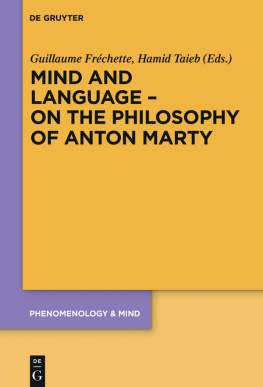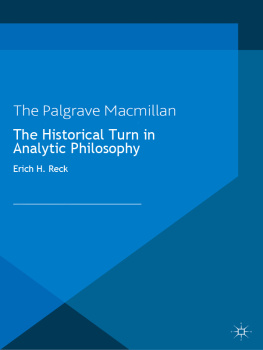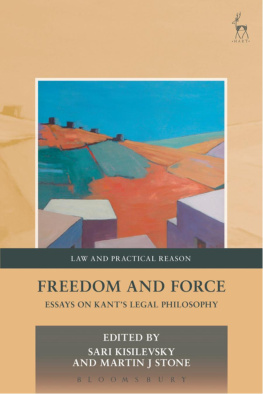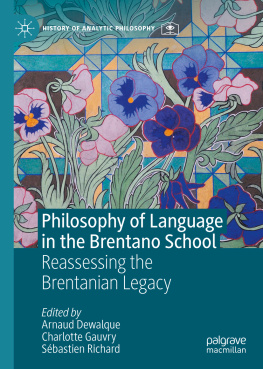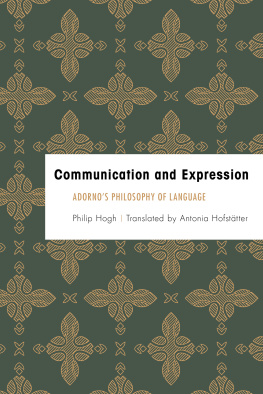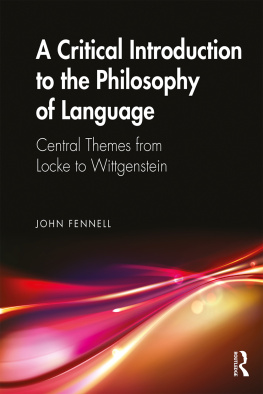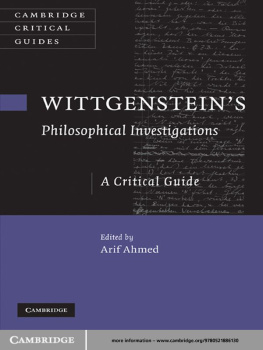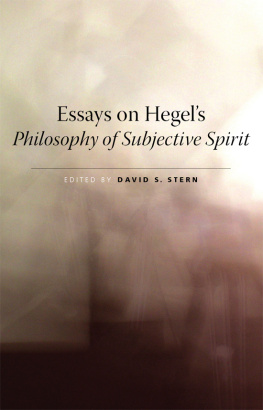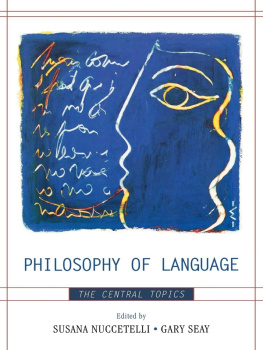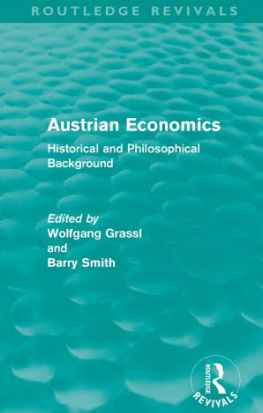Table of Contents
Guide

Mind and Language On the Philosophy of Anton Marty
Phenomenology & Mind

Edited by
Arkadiusz Chrudzimski and Wolfgang Huemer
Volume 19
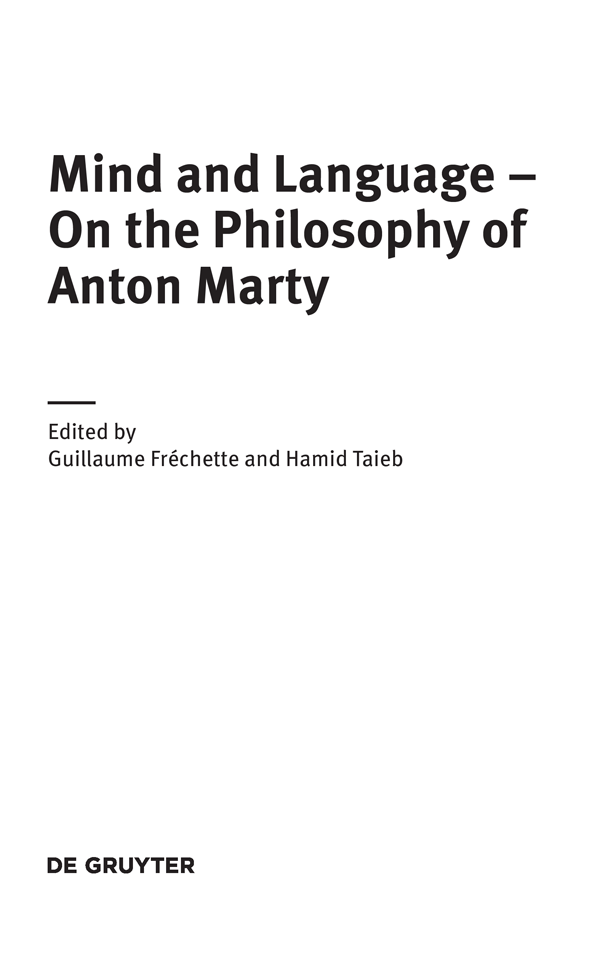
ISBN 978-3-11-052977-7
e-ISBN (PDF) 978-3-11-053148-0
e-ISBN (EPUB) 978-3-11-052978-4
ISSN 2198-2058
Library of Congress Cataloging-in-Publication Data
A CIP catalog record for this book has been applied for at the Library of Congress.
Bibliografische Information der Deutschen Nationalbibliothek
Die Deutsche Nationalbibliothek verzeichnet diese Publikation in der Deutschen Nationalbibliografie; detaillierte bibliografische Daten sind im Internet ber
http://dnb.dnb.de abrufbar.
2017 Walter de Gruyter GmbH, Berlin/Boston
www.degruyter.com
Guillaume Frchette, Hamid Taieb
Anton Marty: From Mind to Language
1From Schwyz to Gttingen: The early years
As a Swiss-born Austro-German philosopher who taught in Czernowitz and in Prague, Marty was not only a cosmopolitan thinker; he had also an exceptional knowledge of the history of philosophy and well-informed inclinations towards specific branches of the discipline. He was influenced by Aristotle, the Scholastics, and early modern philosophers (both rationalists and empiricists), and was unsympathetic towards Kant and German Idealism. Yet his main intellectual inspiration came from his master Franz Brentano, whose conception of philosophy as a scienceespecially his fourth habilitation thesismade a lasting impression on many of his students, most prominently on Marty and Stumpf. By way of presenting the contributions to this volume, we offer here a general outline of Martys life and works, of his Brentanian upbringing, and we sketch some of his central ideas in philosophymore precisely on mind, language, and their ontology, with regards to the themes discussed in the contributions.
Martin Anton Maurus Marty, to give him his full name, was born on the 18 th October, 1847, in the small town of Schwyz, capital of the eponymous canton in central Switzerland. His father was Jakob Josef Alois Marty, a cobbler, and his mother was Elisabetha Reichlin, native of Steinerberg, in the same canton. Anton was the ninth of eleven siblings, four boys and seven girls. The Catholic faith had an important role in the Marty family. Martys father was a sacristan. The oldest brother, Martin Alois, travelled to the United States as a missionary, with the project of converting the Sioux, and later became the second bishop of the Diocese of Saint-Cloud in Minnesota. Antons two other brothers, Johann Baptist and Martin, were also concerned with religious affairs: the first was at the service of Pope Leo XIII in the Swiss Guard, and the second one was a parish priest in Schwyz. According to Martys student, editor, and biographer Oskar Kraus (1916: 13), the young Anton had a peculiar temperament compared to other children: he did not take part in their frequent fights, but preferred to
It was also in Mainz, in the same year, that Marty studied Brentanos dissertation of 1862, The Manifold Meanings of Being in Aristotle . The book had a strong influence on him, and his teachers there, Ketteler, Moufang, and Brck advised him to pursue his studies under Brentanos guidance in Wrzburg (Kraus 1916: 3). In the winter semester of 1868/69, Marty finally went to Wrzburg and spent the whole academic year there, attending Brentanos lectures on the history of philosophy, logic, and metaphysics. Brentanos influence on Marty at this point in his philosophical development (it should be recalled that he was only 22 at the time) must have been particularly strong, since Marty spent only a year with Brentano. Later, in 1869, he was appointed Professor of Philosophy at the Lyceum Maria Hilf in Schwyz and was ordained as a priest, teaching in Schwyz for five years. In parallel, he was still engaged in a kind of distance learning with Brentano, since his friend Stumpf regularly sent him notes taken during Brentanos lectures.
In early 1873, Marty prepared an application for another position at the Kantonschule in Lucern. In preparation for this application, he began to write his PhD dissertation and planned, together with Stumpf (who was already Privatdozent in Gttingen at this point), to submit it in Gttingen under the supervision of Lotze. On the 23 rd May, 1873, a first draft was completed and was sent to Brentano for comments. In parallel with the preparation of his PhD dissertation, during the summer and autumn of 1873, he prepared for his abandonment of the priesthood, which he justified to Brentano in a lengthy letter written in October 1873. He probably left the priesthood in the spring of 1874, since he sent his resignation letter from Schwyz in May 1874.
2From Gttingen to Prague: Dissertation and habilitation
The resignation caused a scandal, which made Marty a persona non grata in Schwyz and forced him to leave, also seriously endangering his prospects for the continuation of his academic career. After leaving Schwyz, he then spent some time in Aschaffenburg (living with Brentanos mother) where he finished his dissertation with the help of Stumpf. In June 1875, his PhD dissertation was finally accepted in Gttingen. The dissertation (Marty 1875) began with a critique of nativistic positions on the origins of language, according to which there is an innate connection between some articulated sounds and some intuitions or thoughts. For Marty, language is not innate. It emerges from a series of voluntary but unconcerted attempts on the part of human beings to influence other human beings psychic lives. As Marty puts it, linguistic expressions are formed purposively but without planification ( absichtlich aber planlos ). Such an account of the origins of language has aptly been coined an empirical teleological accountin opposition to Steinthal, but also to Wundt (Funke 1927: 129 sq .). To argue against the nativistic position, Marty follows Brentano in saying that the methods of philosophy are nothing other than the methods of natural science. This is why his work on linguistics, anthropology, and zoology relies heavily on building a case against nativism. According to Marty, one could reasonably suppose that the first humans had primitive mental phenomena similar to ours and mastered the ability to perform voluntary movements. Since communication is the essence of language, the first humans most likely wanted to communicate their mental states, and by analogy, information about physical events. Linguistic tools were then developed out of this intention, following different laws of genetic psychology (such as the laws of association and habit). Similar ideas in the line of Martys empirical teleological account were being developed by his contemporaries, for instance by Austrian economists such as Carl Menger (1969).
A few days before his promotion, Marty had already been appointed to the newly founded University of Czernowitz, the most remote university of the Austrian Empire in Bukovina. This appointment was the result of Brentanos efforts to secure Marty a position in Austria.
Not much is known about Martys Bukovinian period, besides the fact that he apparently spent most of his time preparing his habilitation thesis, which was submitted in Gttingen in 1879, and approved by Lotze once again. This but language does not always capture the differences we perceive or notice (Wenning 1990).

